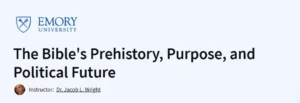What you will learn in The Ancient Greeks Course
Early Greek Civilizations: Explore the Minoan and Mycenaean civilizations through archaeological evidence, understanding their societal structures and cultural contributions.
The Dark Ages and Homeric Epics: Investigate the period following the collapse of Mycenaean civilization, focusing on the Homeric epics—The Iliad and The Odyssey—and their role in shaping Greek cultural identity.
The Archaic Age (ca. 800-500 BCE): Study the development of the Greek polis (city-state), colonization efforts, the resurgence of literacy, and the emergence of hoplite warfare.
Sparta and Athens: Analyze the contrasting political and social structures of Sparta and Athens, including the roles of lawgivers like Lycurgus and Solon.
The Persian Wars and Athenian Democracy: Examine the causes and outcomes of the Persian Wars and the establishment of democracy in Athens.
The “Great 50 Years” (ca. 480-431 BCE): Delve into Athens’ Golden Age, focusing on its imperial expansion, artistic achievements, and the role of leaders like Pericles.
The Peloponnesian War: Study the conflict between Athens and Sparta, analyzing its causes, key events, and consequences.
The End of the Century and Beyond: Explore the decline of Athens, the rise of Macedon under Philip II, and the legacy of Alexander the Great.
Program Overview
Early Greek Civilizations
⏳ 2 hours
- An introduction to the Minoan and Mycenaean civilizations, their societal structures, and cultural contributions.
The Dark Ages and Homeric Epics
⏳ 2 hours
- Exploration of the Homeric epics and their role in shaping Greek cultural identity and mythology.
The Archaic Age (ca. 800-500 BCE)
⏳ 3 hours
- The rise of the Greek polis, early colonization efforts, and the development of Greek warfare and literacy.
Sparta and Athens
⏳ 3 hours
- A comparative study of Sparta and Athens, focusing on their political, social, and military differences.
The Persian Wars and Athenian Democracy
⏳ 2 hours
- Analysis of the causes and outcomes of the Persian Wars and the development of democracy in Athens.
The Great 50 Years (ca. 480-431 BCE)
⏳ 2 hours
- Athens’ Golden Age, focusing on imperial expansion, cultural achievements, and the role of leaders like Pericles.
The Peloponnesian War
⏳ 3 hours
- Study of the conflict between Athens and Sparta, analyzing its causes, key events, and consequences.
The End of the Century and Beyond
⏳ 2 hours
- The decline of Athens and the rise of Macedon under Philip II and Alexander the Great.
Get certificate
Job Outlook
- Ideal for careers in academia, particularly in history, philosophy, and cultural studies.
- Relevant for roles in museums, archives, and cultural heritage institutions.
- Useful for writers, editors, and content creators focusing on ancient history, philosophy, or classical literature.
Specification: The Ancient Greeks
|
FAQs
- The course is structured for beginners with no prior historical training.
- It introduces key events, figures, and cultural elements step by step.
- Complex terms and historical contexts are explained in accessible ways.
- Anyone with curiosity about history, literature, or culture can follow along.
- A general interest in the past is more important than formal study.
- Ancient Greece laid foundations for democracy, philosophy, and theater.
- Their contributions to science, politics, and art influence modern society.
- Many modern words, ideas, and systems have Greek origins.
- Understanding their history helps explain today’s cultural and political systems.
- It provides perspective on how civilizations shape human progress.
- The course goes beyond wars, covering literature, art, and philosophy.
- You’ll learn about daily life, religion, and traditions in Greek society.
- Attention is given to achievements in drama, poetry, and architecture.
- Politics and military history are included but balanced with cultural aspects.
- This creates a well-rounded picture of Greek civilization.
- Studying how Greeks debated ideas sharpens reasoning and argument skills.
- Exposure to philosophical questions encourages deeper reflection.
- Comparing ancient and modern societies fosters analytical thinking.
- It helps identify patterns in human behavior and governance.
- Critical thinking skills gained can be applied in academics, work, or daily life.
- Skills gained include research, analysis, and communication—all valuable in many fields.
- Knowledge of cultural history supports careers in education, law, politics, and writing.
- It enriches creativity, useful in media, storytelling, and design.
- Employers value the ability to see connections across cultures and time.
- Beyond careers, it builds cultural literacy, making you a more informed global citizen.





